Can't allow access to camera and microphone in iPhone
Apr 23, 2024 am 11:13 AMAre you getting "Unable to allow access to camera and microphone" when trying to use the app? Typically, you grant camera and microphone permissions to specific people on a need-to-provide basis. However, if you deny permission, the camera and microphone will not work and will display this error message instead. Solving this problem is very basic and you can do it in a minute or two.
Fix 1 – Provide camera, microphone permissions
You can provide the necessary camera and microphone permissions directly in the settings.
Step 1 – Go to the Settings tab.
Step 2 – Open the Privacy & Security panel.
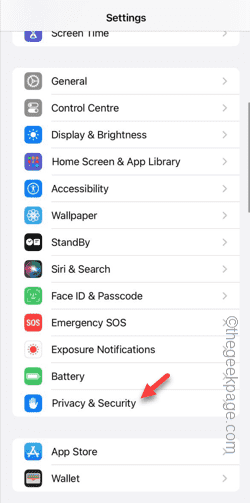
Step 3 – Turn on the “Camera” permission there.
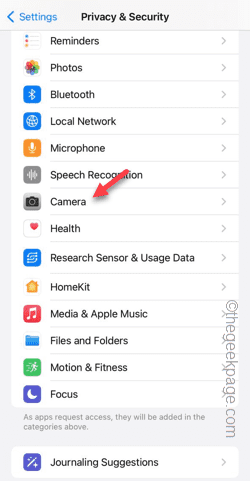
Step 4 – Inside, you will find a list of apps that have requested your phone’s camera permission.
Step 5 – Turn on the “Camera” permission for the specified app.
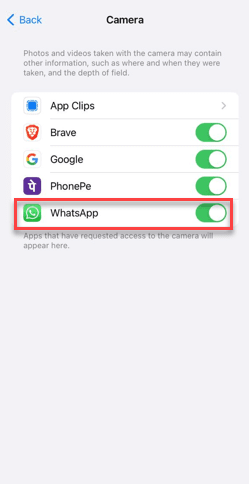
Step 6 – Go back to the main Privacy & Security tab.
Step 7 – After a while, turn on “Microphone”.
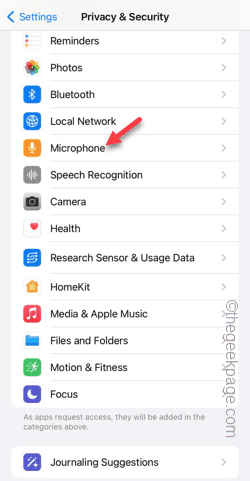
# Step 8 – Following the same process, you can allow camera, microphone permissions for other apps.
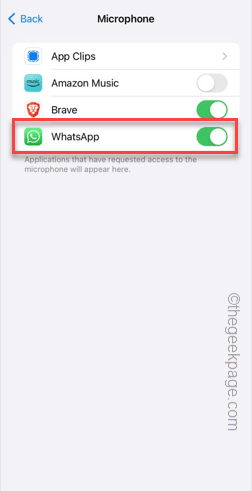
# Now open the app again and try to use the camera or record a reel in the app. You will no longer be faced with this message.
Fix 2 – Change App Settings
Change app settings directly from the Settings page.
Step 1 – Just go to Settings.
Step 2 – Instead, swipe down and find the app in the list to open its settings.
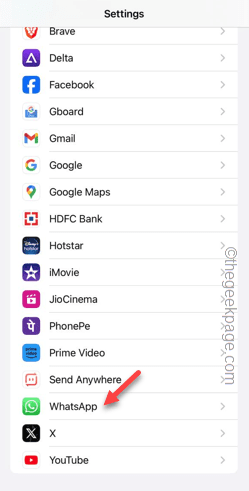
# Step 3 – Once in the app settings, make sure the Microphone and Camera settings are enabled.
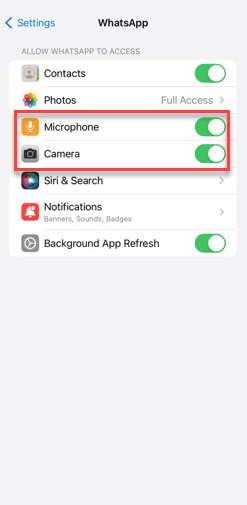
Now, if you see this message in multiple apps, you must also enable camera and microphone permissions for those apps
Fix 3 – Uninstall and reinstall the app
Another easy fix is ??to uninstall and reinstall the app. When it asks for camera and microphone permission, allow it.
Note – If you encounter this issue in WhatsApp, you should create a local backup of your account before uninstalling it.
Step 1 – Find the App on your phone screen or App Library.
Step 2 – Then, press and hold the app and tap on “Delete App”.
Step 3 – Click on “Remove App” to delete the app.
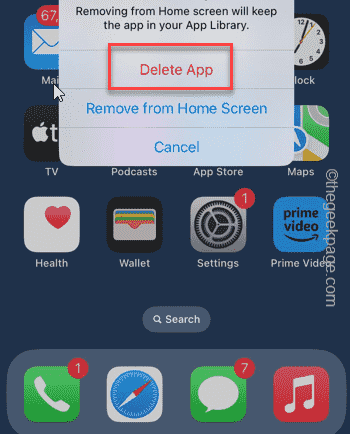
Step 4 – After a while, open the App Store.
Step 5 – Reinstall the app on your phone.
Step 6 – Try to access the camera from the app. It will display this message –
WhatsApp does not have access to your camera. To enable access, tap Settings and turn on Camera.
Step 7 – Tap on “Settings”.
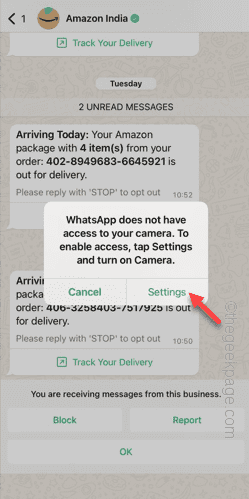
Step 8 – Turn on “Camera” and “Microphone” permissions.
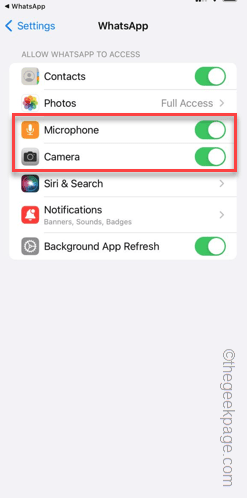
Return to the app after this and you can use the camera and microphone normally.
Check if this helps.
Fix 4 – Change content and privacy restrictions
If you still can’t use the camera and microphone in the app, you can change the content and privacy restrictions settings.
Step 1 – Open Settings and then Screen Time settings.
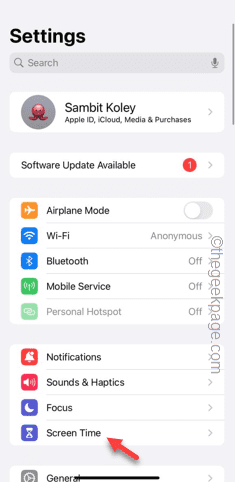
Step 2 – Find the “Content and Privacy Restrictions” module and open it.
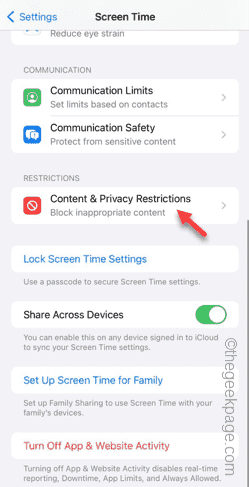
Step 3 – Open Photos settings.
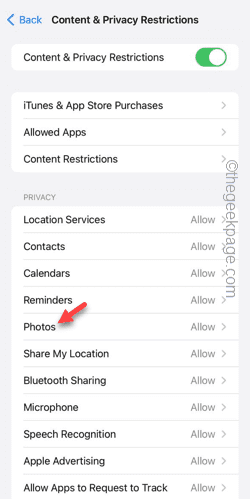
Step 4 – Set it to “Allow Changes”.
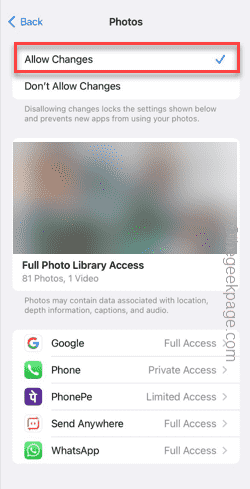
#Step 5 – Click the “Back” icon to enter the main content and privacy restrictions page.
Step 6 – This time, open the Microphone settings.
Step 7 – Select the “Allow changes” option.
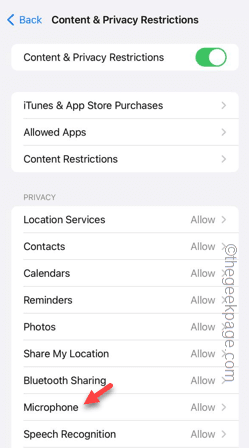
# After that, open the app and try to access the camera and microphone in the app.
This way, you can access these contents in the application without any problem.
The above is the detailed content of Can't allow access to camera and microphone in iPhone. For more information, please follow other related articles on the PHP Chinese website!

Hot AI Tools

Undress AI Tool
Undress images for free

Undresser.AI Undress
AI-powered app for creating realistic nude photos

AI Clothes Remover
Online AI tool for removing clothes from photos.

Clothoff.io
AI clothes remover

Video Face Swap
Swap faces in any video effortlessly with our completely free AI face swap tool!

Hot Article

Hot Tools

Notepad++7.3.1
Easy-to-use and free code editor

SublimeText3 Chinese version
Chinese version, very easy to use

Zend Studio 13.0.1
Powerful PHP integrated development environment

Dreamweaver CS6
Visual web development tools

SublimeText3 Mac version
God-level code editing software (SublimeText3)

Hot Topics
 OEX official website entrance ios directly enter OEX platform official website Apple login portal
Jul 03, 2025 pm 02:06 PM
OEX official website entrance ios directly enter OEX platform official website Apple login portal
Jul 03, 2025 pm 02:06 PM
The OEX platform is a highly-watched digital asset trading platform, providing users with a safe, convenient and efficient trading experience. Here, you can conveniently buy, sell and trade various mainstream digital currencies such as Bitcoin and Ethereum, and enjoy the rich financial derivative services provided by the platform.
 How to download the iOS version of Ethereum App? Instructions for use of Ethereum official website app
Jul 04, 2025 am 11:48 AM
How to download the iOS version of Ethereum App? Instructions for use of Ethereum official website app
Jul 04, 2025 am 11:48 AM
The official Ethereum app does not exist, iOS users can manage ETH through cryptocurrency wallets or exchange apps. Recommended mainstream apps include: 1. Binance, powerful and integrated Web3 wallet, suitable for trading and DeFi; 2. OkX, with smooth experience and Web3 integration, supporting DeFi and NFT; 3. MetaMask, as the core non-custodial wallet, is a necessary tool for connecting DeFi and NFT platforms; 4. Huobi (HTX), provides rich trading pairs and financial derivatives, suitable for old users; 5. Trust Wallet, simple interface, suitable for new non-custodial wallets; 6. Gate.io, suitable for exploring emerging currencies
 Binance Exchange Official Website_Binance Official Website Security Portal
Jul 18, 2025 am 06:09 AM
Binance Exchange Official Website_Binance Official Website Security Portal
Jul 18, 2025 am 06:09 AM
Binance is the world's leading digital asset trading platform, providing a variety of services and supporting multilingual and fiat currency recharges; if the official website access is restricted, you can use official acceleration services or mirroring sites; verify the security of the official website, you must confirm that the URL starts with https, avoid suspicious links, and enter through recommended links or search engine advertising logos; to deal with restricted access, you can use Binance's official APP, acceleration solutions in the official announcement, and follow official social media to obtain entrance updates; at the same time, users are reminded not to disclose account information, and must enable two-step verification and other security measures.
 How to use PHP to build social sharing functions PHP sharing interface integration practice
Jul 25, 2025 pm 08:51 PM
How to use PHP to build social sharing functions PHP sharing interface integration practice
Jul 25, 2025 pm 08:51 PM
The core method of building social sharing functions in PHP is to dynamically generate sharing links that meet the requirements of each platform. 1. First get the current page or specified URL and article information; 2. Use urlencode to encode the parameters; 3. Splice and generate sharing links according to the protocols of each platform; 4. Display links on the front end for users to click and share; 5. Dynamically generate OG tags on the page to optimize sharing content display; 6. Be sure to escape user input to prevent XSS attacks. This method does not require complex authentication, has low maintenance costs, and is suitable for most content sharing needs.
 How to create a contact group on iPhone
Jul 13, 2025 am 01:17 AM
How to create a contact group on iPhone
Jul 13, 2025 am 01:17 AM
iPhone does not support creating contact groups directly in the address book application, but similar functions can be achieved through the following methods: 1. Use the "Group" function in the address book application, click "Edit" > "Add Group" to create a custom group; 2. Add each contact to the corresponding group by editing it; 3. If you need to send a group message, you can create a new multi-person conversation in the information application; 4. Use iCloud or Gmail to synchronize tagged groups to facilitate the management of a large number of contacts on the computer. These methods are used in conjunction with efficient management of contact groups.
 PHP calls AI intelligent voice assistant PHP voice interaction system construction
Jul 25, 2025 pm 08:45 PM
PHP calls AI intelligent voice assistant PHP voice interaction system construction
Jul 25, 2025 pm 08:45 PM
User voice input is captured and sent to the PHP backend through the MediaRecorder API of the front-end JavaScript; 2. PHP saves the audio as a temporary file and calls STTAPI (such as Google or Baidu voice recognition) to convert it into text; 3. PHP sends the text to an AI service (such as OpenAIGPT) to obtain intelligent reply; 4. PHP then calls TTSAPI (such as Baidu or Google voice synthesis) to convert the reply to a voice file; 5. PHP streams the voice file back to the front-end to play, completing interaction. The entire process is dominated by PHP to ensure seamless connection between all links.
 How to check if an iPhone is unlocked
Jul 15, 2025 am 01:17 AM
How to check if an iPhone is unlocked
Jul 15, 2025 am 01:17 AM
TocheckifaniPhoneisunlocked,1)gotoSettings>Cellular>CellularDataOptionsandlookforlabelslike“Unlocked”or“NoSIMrestrictions,”2)insertadifferentcarrier’sactiveSIMcardandseeifthephoneacceptsit,3)usetheIMEInumberononlinetoolslikeIMEI.infotocheckunlo
 How to use PHP to develop AI-driven advertising delivery PHP advertising performance optimization solution
Jul 25, 2025 pm 06:12 PM
How to use PHP to develop AI-driven advertising delivery PHP advertising performance optimization solution
Jul 25, 2025 pm 06:12 PM
PHP provides an input basis for AI models by collecting user data (such as browsing history, geographical location) and pre-processing; 2. Use curl or gRPC to connect with AI models to obtain click-through rate and conversion rate prediction results; 3. Dynamically adjust advertising display frequency, target population and other strategies based on predictions; 4. Test different advertising variants through A/B and record data, and combine statistical analysis to optimize the effect; 5. Use PHP to monitor traffic sources and user behaviors and integrate with third-party APIs such as GoogleAds to achieve automated delivery and continuous feedback optimization, ultimately improving CTR and CVR and reducing CPC, and fully implementing the closed loop of AI-driven advertising system.






